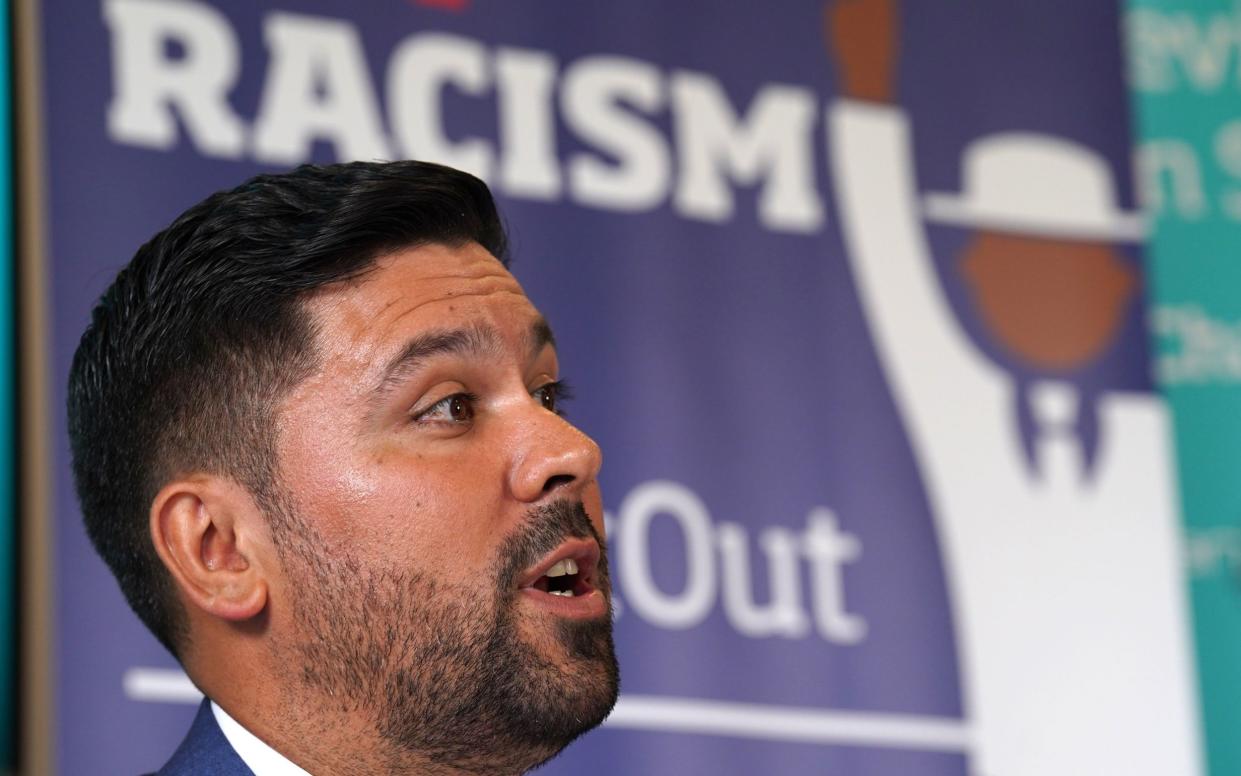The BBC has revealed the moral abyss at its core

I’ve never commentated on a cricket match, let alone been part of the BBC’s Test Match Special (known everywhere as TMS) team. But, truth be told, ever since I was a boy, sneakily listening under my duvet late at night to the likes of Alan McGilvray commentate on the 1974/75 Ashes series down under, it’s been something of a dream.
It’s taken nearly 50 years, but now I know what I need to do to get the gig on TMS: post racist remarks on social media – and make sure that I target Jews especially.
On Tuesday, the TMS team for the Scotland v England game in the T20 World Cup included former Scotland cricketer Qasim Sheikh. The same Qasim Sheikh, that is, who has posted – and then reposted, just in case they weren’t noticed the first time – a series of jaw-droppingly racist comments online.
One image which he shared was of various world leaders including Benjamin Netanyahu, Joe Biden and Rishi Sunak with Hitler moustaches photoshopped on alongside the heading: “Kids Killer Union”. In another, after the October 7 massacre of 1200 Israelis, he wrote that Palestinians have “a right to defend themselves”.
You might have thought that posting such vile comments would give the BBC cause to reconsider whether Sheikh was an appropriate figure to have as a commentator.
Perhaps Abu Hamza wasn’t available. But no, it seems the BBC wasn’t remotely troubled by the fact that one of its commentators thinks it a good idea to post anti-Semitic bilge online.
What makes this more than merely yet another example of the BBC shooting itself in the foot, however, is the double standard it reveals.
In 2021 former England captain Michael Vaughan was accused by Yorkshire team-mate Azeem Rafiq of having made a racist remark in 2009 – which he denied. The mere accusation that Vaughan had said something led to his immediate suspension from all work with the BBC. He became persona non grata with the BBC for nearly two years until the ECB’s Cricket Disciplinary Committee cleared him of making the remark.
For Vaughan, an accusation with no supporting evidence was enough to see him barred. For Sheikh, however, actual racist posts, in his name, by his own hand, designed to be seen by as many people as possible, had zero impact on his BBC employment.
Not that this is in any way inconsistent by the BBC, when you consider its handling of Gary Lineker. In January, the Match of the Day presenter reposted a call on social media by the Palestinian Campaign for the Academic & Cultural Boycott of Israel calling for Israel to be barred from tournaments and games “until it ends its grave violations of international law… particularly its apartheid rule and the crime of genocide it is perpetuating in Gaza”.
Singling out the world’s only Jewish state for boycott is held by many to be the very definition of anti-Semitism.
Last year Lineker had the gall to upbraid Sir Simon Schama over what constitutes anti-Semitism. Lineker had posted his disagreement with Suella Braverman’s reference to “hate marches” in London, writing: “Marching and calling for a ceasefire and peace so that more innocent children don’t get killed is not really the definition of a hate march.”
Sir Simon responded: “Why would you have a ceasefire with terrorists (Hamas) whose leaders have explicitly said they want to do October 7 again and again until Israel is annihilated?”
Lineker dismissed Sir Simon thus: “Different point entirely. Doesn’t make it a hate march.”
And last November Lineker endorsed a video conversation on the theme of “Israel is committing genocide” between Owen Jones and Raz Segal, an academic whose response to the October 7 massacre was to write a piece for The Guardian telling its readers that “Israel must stop weaponising the Holocaust”. Lineker said it was “Worth 13 minutes of anyone’s time”.
Lineker has earlier been suspended over a post criticising the government’s asylum policy, but was swiftly reinstated when his colleagues threw toys out of their prams. Since then, the BBC has been happy for its star presenter to post whatever he wants, even when it is deeply offensive – and seen as poisonous – by many Jews.
There is a pattern here. Vaughan was cut loose immediately because one person alleged he had said something racist. But when the subject of a presenter or commentator’s remarks is related to Jews, the BBC offers a protective embrace. Is it any wonder the corporation is so loathed by so many in the Jewish community?


